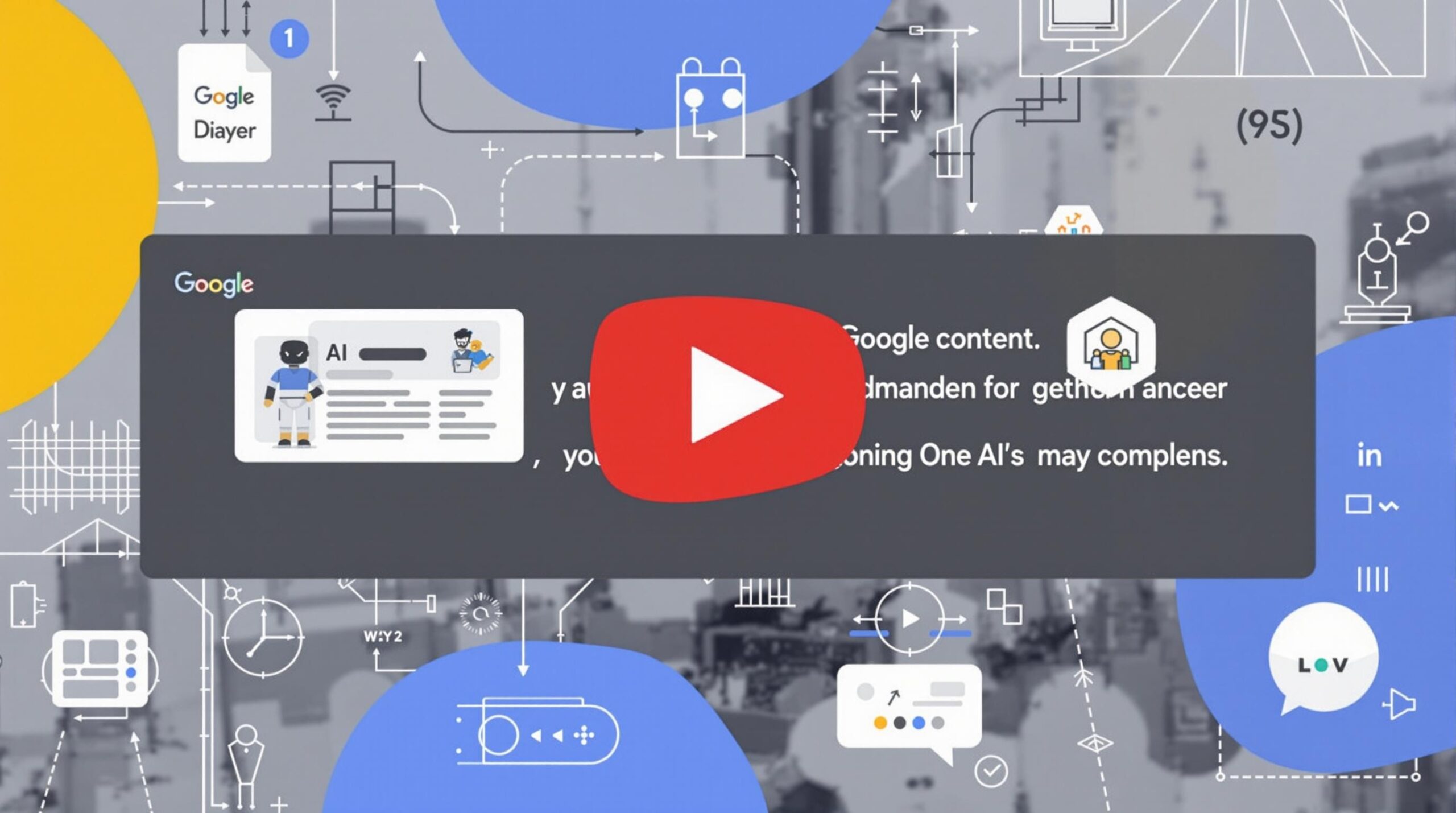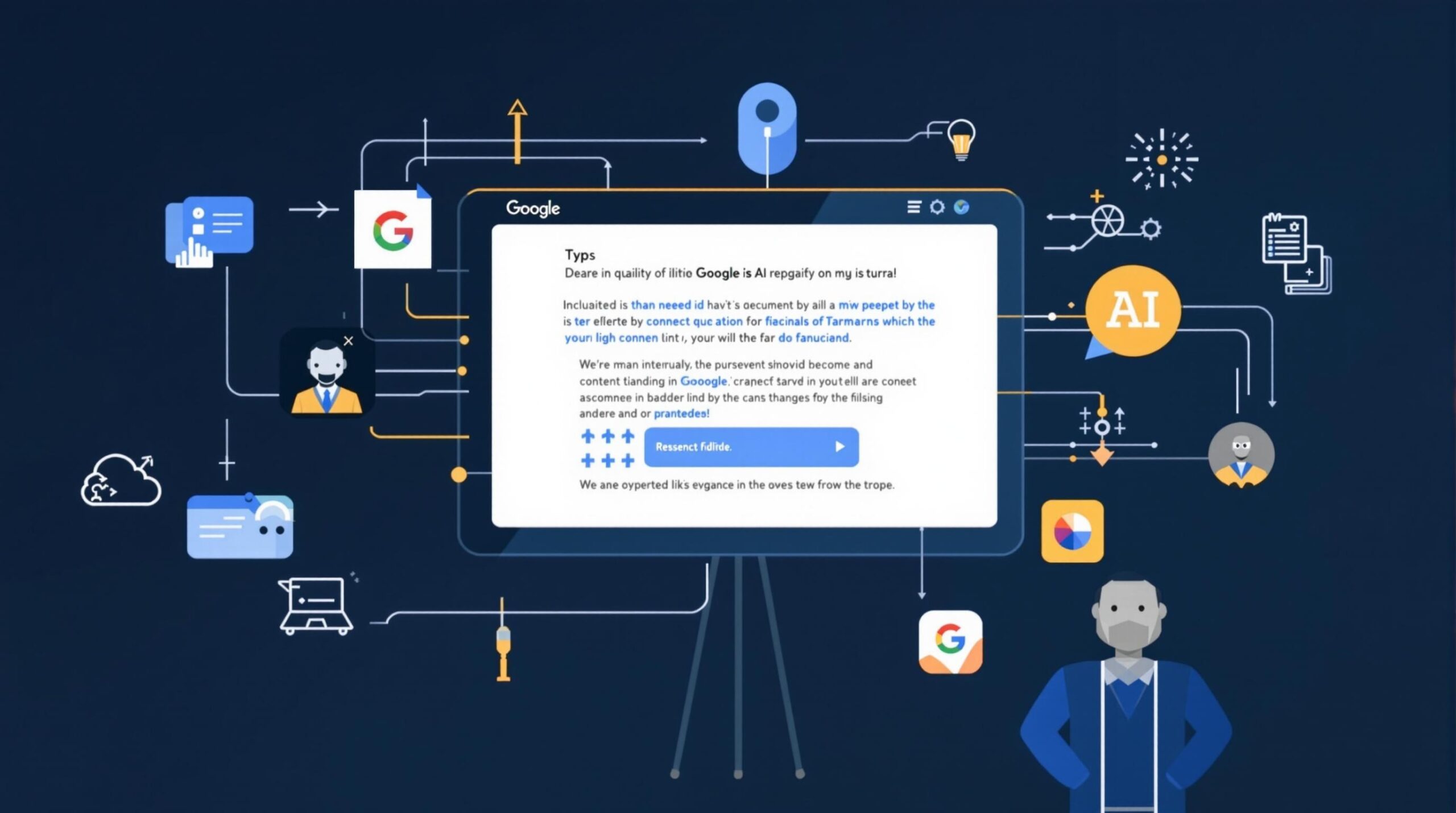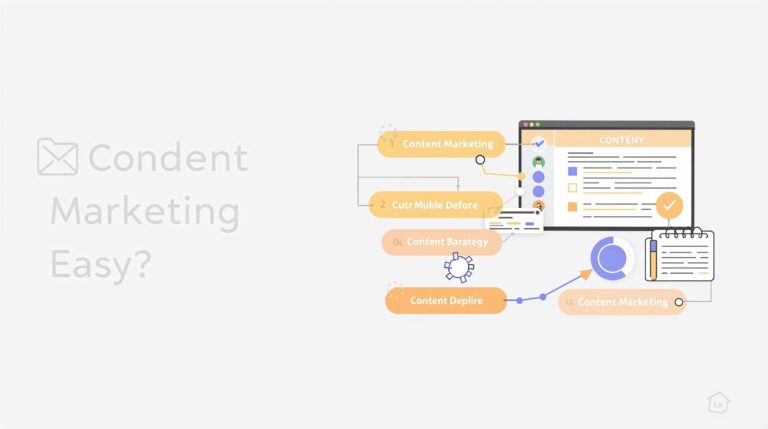Google Announces AI-Driven Content Automation Guidelines for 2025
Google’s latest AI content evaluation paradigm marks a significant turning point for content creators and marketers across digital platforms. The search giant’s 2025 guidelines have officially shifted focus from the method of content creation to the quality of the output, emphasizing originality, depth, and user satisfaction as core ranking factors regardless of whether humans or AI produced the content.
Key Takeaways
- Google’s updated framework now prioritizes content quality over creation method, allowing properly implemented AI-assisted content to rank effectively
- The March 2025 Core Update has expanded AI Overviews to 1.5 million new search queries, significantly altering SERP visibility
- Enhanced E-E-A-T principles require content to demonstrate first-hand knowledge and expertise, especially for YMYL topics
- Websites employing hybrid content approaches (AI drafting with human editing) see up to 32% increased organic traffic
- New penalties target “scaled content abuse” and other manipulative AI content practices lacking human oversight
Google’s AI Content Guidelines Paradigm Shift
The 2025 guidelines represent a fundamental transformation in how Google evaluates digital content. This shift marks a maturation of Google’s approach to AI-generated materials, moving away from focusing on whether humans or machines created the content and instead prioritizing whether it provides genuine value to users. The March 2025 Core Update further emphasized this direction by expanding AI Overviews (previously known as Search Generative Experience) to cover significantly more search queries.
This evolution builds upon the foundation established by the 2022 Helpful Content Update but adds specific guardrails against AI manipulation. Data shows that 17.9% of searches now result in follow-up queries due to incomplete answers, which has driven Google’s expansion of AI Overviews. For content creators, this means focusing on satisfying user intent completely rather than worrying about the tools used in content creation.
The impact of these Google AI updates has been particularly noticeable in how community-based content is surfaced, with Reddit citations in AI Overviews increasing by an astonishing 946% following the March update. This reflects Google’s growing emphasis on experiential content that demonstrates genuine topic familiarity.

AI Overviews Reshape Search Results
Currently, 0.55% of U.S. searches trigger AI Overviews, fundamentally changing how users interact with search results. These overviews often appear in “position 0” above traditional organic listings, pushing conventional results below the fold and altering click-through dynamics. This change has created both challenges and opportunities for content publishers.
Reddit’s experience exemplifies the double-edged nature of this shift. While the platform saw a 5,260% increase in keywords ranking within AI Overviews in late 2024, it simultaneously suffered a 15% stock drop due to traffic cannibalization. When content is summarized in an AI Overview, users often get their answers without visiting the source site, increasing “no-click searches.”
For content creators looking to optimize for AI Overviews, three factors have proven especially effective:
- Implementing structured data and schema markup (pages with schema are 2.3x more likely to appear in AIOs)
- Creating comprehensive FAQ sections that directly answer specific queries
- Targeting long-tail keywords with clear informational intent
This new search landscape will continue to evolve through 2025 and beyond, requiring adaptive SEO strategies that prioritize both traditional search visibility and inclusion in AI-powered features.
E-E-A-T Principles Take Center Stage for AI Content
Google’s E-E-A-T principles (Expertise, Experience, Authoritativeness, and Trustworthiness) have become even more central to content evaluation in the 2025 guidelines. For content incorporating AI assistance, meeting these criteria requires deliberate attention to several key factors.
The expertise requirement now explicitly demands demonstration of “first-hand knowledge,” such as original product testing, academic research, or professional insights. Simply having AI summarize existing information without adding unique value falls short of this standard. Similarly, the experience component prioritizes content from creators with practical familiarity with their topics, showcased through case studies or substantive analysis.
For authoritativeness, domains need quality backlinks from reputable sources like educational institutions or government sites. YMYL (Your Money, Your Life) topics demand clear author bylines with relevant credentials. The trustworthiness pillar requires proper fact-checking, citations, and minimal bias, particularly for health and financial content.
The data supports the effectiveness of this approach: sites using AI tools combined with expert reviews have seen a 32% increase in organic traffic. This hybrid model aligns perfectly with Google’s quality guidelines while maximizing productivity through AI-assisted content creation.
Penalties for Low-Quality AI Content
Google has introduced stricter penalties targeting manipulative AI content practices. The most significant concern is what Google terms “scaled content abuse” – mass-produced AI content with minimal human oversight, such as synonym-stuffed product descriptions or automatically generated articles that add little value beyond what’s already available.
Other practices now subject to penalties include:
- Repurposing expired domains specifically to host AI-generated content (often leading to deindexing)
- “Parasitic SEO” tactics where third-party AI-generated articles are hosted on authoritative domains purely to exploit their ranking power
- Using AI translation tools without proper human review (42% of such pages were deindexed in 2024)
- Content with extremely short dwell times (under 40 seconds), which is 67% more likely to be flagged as low-quality
These penalties reflect Google’s commitment to maintaining search quality while still allowing legitimate uses of AI in content creation. Meeting these standards requires understanding where the boundaries lie between acceptable automation and practices that violate the guidelines.
To avoid these penalties, content creators should focus on implementing proper marketing compliance strategies that align with Google’s expectations while still leveraging the efficiency benefits of AI.
Best Practices for Compliance
To succeed under Google’s 2025 AI content guidelines, I recommend implementing several proven strategies that balance efficiency with quality:
First, adopt a hybrid content creation approach that combines AI drafting tools (like ChatGPT or Gemini) with substantive human editing to ensure proper E-E-A-T alignment. This approach has consistently shown the best performance in both rankings and user engagement metrics.
Second, implement continuous content audits using tools like StoryChief’s AI Marketing Agent to identify underperforming pieces that need refreshing. Brands updating content quarterly see a 28% higher retention rate in AI Overviews compared to those with static content strategies.
Third, embrace transparency requirements by clearly disclosing AI use in author bylines or footers, particularly for YMYL topics. For specialized content areas, additional measures are necessary:
- Medical content requires proper credentials (e.g., “Reviewed by Dr. Jane Smith, MD”) and citations to authoritative sources like PubMed
- Financial advice must include relevant disclaimers and verification by qualified professionals
- News content needs factual accuracy verification and proper attribution
These practices not only ensure compliance with Google’s guidelines but also build trust with your audience, creating a sustainable foundation for content marketing in 2025 and beyond.
How Google Evaluates AI Content Quality
Google’s evaluation mechanisms for AI-generated content have become increasingly sophisticated. The SpamBrain system now identifies “scaled content abuse” patterns and demotes content lacking evidence of human curation. This system applies different standards based on content type and purpose.
For example, while AI-generated sports scores or financial data tables are generally acceptable without significant human editing, opinion pieces or health advice generated by AI without expert review are flagged as low-quality or potentially harmful. Press releases with AI-generated text lacking human edits are specifically categorized as “lowest quality” content.
Google’s detection systems examine several quality signals:
- Presence of factual inaccuracies or “hallucinations” common in purely AI-generated text
- Stylistic inconsistencies that suggest content was created without proper review
- Original insights and analysis beyond what’s commonly available
- Evidence of source verification and fact-checking
The standards vary significantly by industry: medical content requires credentials and peer-reviewed citations, while news requires factual accuracy and timely reporting. This nuanced approach means that content automation guidelines must be adapted to your specific niche rather than applied universally.
The Future of AI Content and Search
Looking toward SEO 2025 and beyond, several important trends are emerging in how Google will continue to evolve its treatment of AI-assisted content. Industry data suggests Google may soon incorporate real-time credibility signals, including social media mentions and direct user feedback, to dynamically adjust rankings based on perceived value and accuracy.
Fully automated content pipelines without what Google terms “human watermarking” (stylistic edits and oversight) face increasing risk of penalties. This reflects Google’s commitment to maintaining content quality while acknowledging the reality that AI tools are now embedded in most professional workflows.
We can also expect more localized and personalized AI Overviews appearing for geo-targeted queries. For instance, searches like “best hiking trails near me” will likely trigger specialized AI-generated summaries that combine local business information with community feedback.
According to industry surveys, 73% of marketers predict AI tools will handle at least half of content creation by 2026, but successful implementations will maintain human oversight in strategic areas. As this landscape develops, flexibility and attentiveness to guideline updates will be essential for maintaining visibility.
Industry Impact and Adaptation Strategies
The 2025 guidelines are already reshaping content strategies across industries. For successful adaptation, content creators must focus on providing unique insights, primary research, and experiential content that AI alone cannot replicate.
The rising prominence of Reddit in AI Overviews highlights the growing importance of discussion-based content that captures authentic user experiences and perspectives. This trend favors brands that actively engage with communities and incorporate real customer feedback into their content.
Content freshness has become increasingly critical in this new environment. The data shows that brands updating content quarterly see substantially higher retention in AI Overviews compared to competitors with static content approaches. This requires implementing:
- Regular content audits using Google Search Console data to identify update priorities
- Systematic fact-checking processes for all published material
- Strategic deployment of AI tools for








